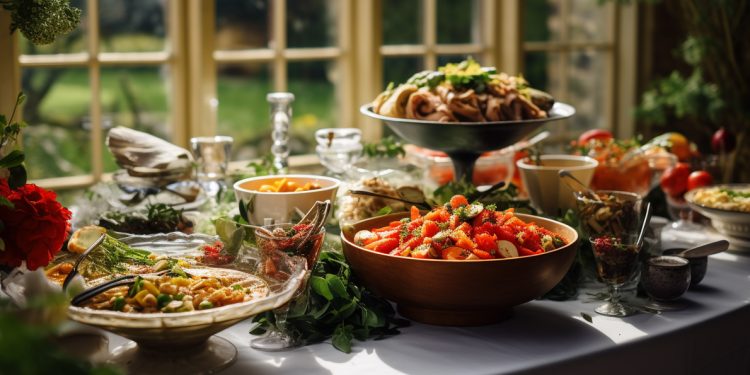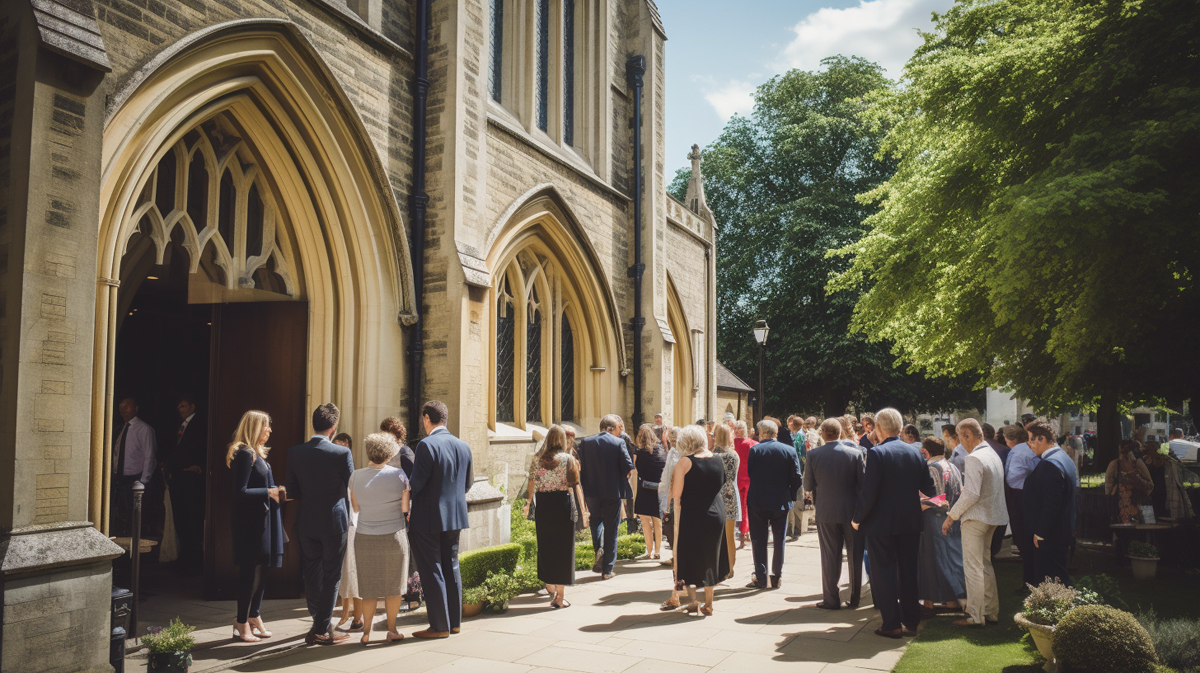Wedding Breakfast Etiquette: Do’s and Don’ts for Hosts and Guests

In modern weddings, the wedding breakfast, a term firmly established in tradition, is often a source of attraction and pleasure. Contrary to popular belief, it does not always relate to a breakfast meal. It is traditionally the first meal a couple enjoys after their wedding ceremony, symbolising the beginning of their life together.
This meal, ranging from a lavish banquet to a modest gathering, is not just about the food; it’s a celebration of unity, love, and the future.
In this context, understanding and adhering to etiquette is crucial for both hosts and guests. For hosts, it’s about creating an inviting and memorable experience for their guests honouring the occasion’s significance.
For guests, it’s about showing respect and appreciation for the couple’s momentous day. In this setting, Etiquette goes beyond mere table manners; it encompasses the entire spectrum of interaction, from responding to invitations to the conduct at the event.
As we enter into the complexities of wedding breakfast etiquette, remember that these principles are about preserving tradition and creating a joyous and harmonious event for all involved.
Understanding Wedding Breakfast
The wedding breakfast, intriguingly, is not a morning affair. It’s the first meal a newlywed couple shares after their wedding ceremony. This event is steeped in tradition, symbolising the dawn of their married life together. It’s a significant part of the wedding day, filled with customs and meanings.
Wedding breakfasts differ from other wedding events; here are some criteria for a wedding breakfast.
Timing: The wedding breakfast is unique as it usually takes place immediately after the marriage ceremony, unlike other wedding events that might be spread over different days or times.
Symbolism: More than just a meal, the wedding breakfast is a symbolic gathering, representing the couple’s first shared act of matrimony, which sets it apart from other celebrations.
Intimacy and Scale: This event is often more intimate, involving close family and friends, in contrast to the larger and more inclusive wedding reception.
Tradition and Rituals: It carries a rich heritage of customs and rituals, some centuries old, making it distinct from more modern and casual wedding events.
Formality and Atmosphere: The wedding breakfast tends to have a more formal tone, with structured seating and speeches, as opposed to the relaxed and free-flowing nature of other wedding gatherings like evening receptions.
Etiquette for Hosts
Planning and Preparation
When planning an event, selecting a menu that caters to various dietary needs is crucial. Consider including vegetarian, vegan, and gluten-free options to accommodate all guests.
Additionally, deciding on a dress code is essential for setting the event’s tone. Whether casual, formal, or themed, communicate this clearly in your invitations to avoid any guest confusion.
This upfront communication helps ensure everyone feels comfortable and included, contributing to a more enjoyable and cohesive event.
Hosting Responsibilities
As a host, warmly greeting each guest upon arrival sets a welcoming tone. Efficiently managing seating arrangements can foster comfortable interactions, especially in a mixed group.
It’s important to consider the timing and flow of the breakfast, ensuring that it starts and ends at a reasonable hour and that there’s a smooth transition between courses or activities.
Attention to these details enhances the overall experience and ensures guests feel valued and well-cared for.
Special Touches
Adding personal touches to an event can make it memorable. This could involve personalised place settings or a small parting gift that reflects the occasion. Always prioritise guest comfort, such as adjusting room temperature or providing extra seating.
Incorporating a wedding musician is another special touch that can significantly enhance the atmosphere. The right musician can add a layer of elegance and emotion, whether through the gentle strumming of a guitar or the romantic melody of a violin.
This musical element not only enriches the sensory experience of your event but also creates a beautiful soundtrack to your special day, making it even more unforgettable for your guests.
You can use a music agency to hire a wedding musician easily and affordably. UK Live Entertainment is known as the biggest entertainment agency in the United Kingdom. If you are in London and arranging a wedding ceremony very soon, don’t miss their exclusive offers.
Etiquette for Guests
Before the event
As a guest, responding to invitations promptly is important, adhering to RSVP etiquette. This shows respect for the host’s planning efforts and assists in accurate headcount management.
Additionally, take time to understand and respect the dress code specified for the event. Dressing appropriately demonstrates consideration for the event’s tone and respect for the host’s wishes, ensuring you blend seamlessly into the occasion’s atmosphere.
During the event
Punctuality is key; arriving on time shows respect for the host and the event. Once there, engage in appropriate behaviour that aligns with the event’s nature. If it’s a seated breakfast, understand the etiquette involved, such as using the correct utensils and waiting for everyone to be served before starting.
For buffet-style meals, queue politely and take reasonable portions. Socialise respectfully, being mindful of the hosts and other guests, and contributing to a pleasant and inclusive atmosphere.
Post-Event Etiquette
After the event, it’s courteous to thank the hosts in person as you leave or through a follow-up message. Expressing gratitude for their hospitality and the effort put into the event is polite and fosters positive relationships.
Briefly mentioning specific aspects you enjoyed can be a thoughtful touch if appropriate. This post-event etiquette is important to being a gracious guest and leaves a lasting, positive impression.
Common Do’s and Don’ts for Hosts
Here are some common do’s and don’ts for hosts.
Do’s:
1. Personalise the experience for each guest.
2. Be attentive to guests’ needs and preferences.
3. Plan the event schedule meticulously to avoid delays.
4. Ensure comfortable seating and ambience for all guests.
5. Be prepared to handle unexpected situations gracefully.
Don’ts:
1. Overlook individual guest comfort and dietary restrictions.
2. Let the event run off-schedule or start late.
3. Neglect the importance of clear communication about the event details.
4. I forgot to thank the guests for attending.
5. Allow one aspect (like music or speeches) to dominate the event excessively.
Common Do’s and Don’ts for Guests
Here are some common do’s and don’ts for guests.
Do’s:
1. Respond promptly to invitations and respect the RSVP deadline.
2. Dress according to the specified dress code.
3. Arrive on time and engage respectfully with other guests.
4. Thank the host for their hospitality.
5. Be mindful of your behaviour, ensuring it aligns with the event’s tone.
Don’ts:
Ignore the dress code or dress inappropriately for the occasion.
1. Use your phone excessively, especially during speeches or performances.
2. Arrive too early or too late, disrupting the event’s flow.
3. Overindulge in food or drink, leading to inappropriate behaviour.
4. Leave without saying goodbye to the host or without expressing gratitude.
Wrap up
Whether you’re a host or a guest at a wedding breakfast, understanding and practising proper etiquette is key to ensuring a memorable and harmonious event.
For hosts, it’s about thoughtful planning, attention to detail, and making each guest feel special.
For guests, it’s showing respect and appreciation through timely responses, appropriate attire, and courteous behaviour.
Remember, this event is more than just a meal; it’s a celebration of new beginnings and shared joy. By following these simple dos and don’ts, everyone can make the wedding breakfast a beautiful, seamless experience that honours the couple’s union and leaves lasting, happy memories for all.










